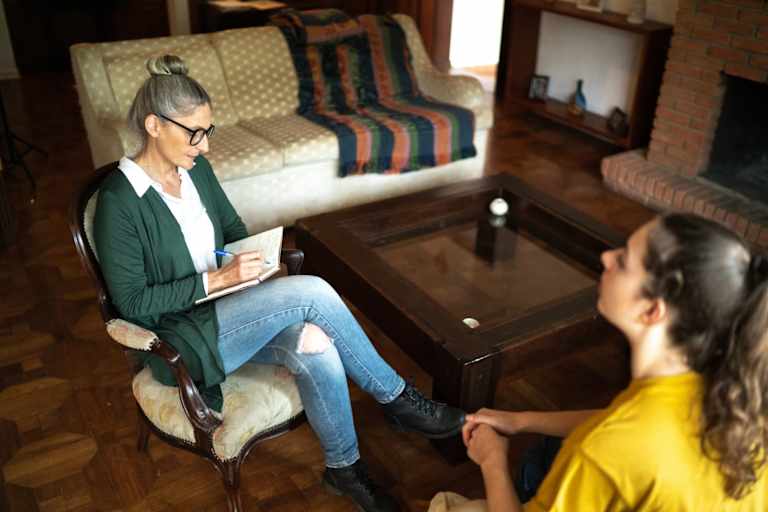Master’s in Counseling Degrees: Costs, Curriculums, Requirements
A master’s in counseling can prepare you for clinical practice and other advanced counseling careers. Research program details, costs, career paths, and more.Why Psycholology.org?
The Psychology.org team includes writers, editors, and contributing psychology students and professionals dedicated to helping you navigate the field. We follow a strict editorial and review process to ensure our content is up-to-date, factual, and relevant. Learn more aboutour editorial process.
Key Takeaways
- A master’s in counseling focuses on client types, patient conditions, and counseling approaches.
- Programs span two years full time or 3-4 years part time, including fieldwork and internships to prepare you for licensure.
- Selecting a program entails evaluating the curriculum, delivery format, cost, and reputation, with CACREP accreditation key for quality and licensing.
Earning a master’s in counseling can prepare you to pursue several counseling roles. Learn how to make a difference as a licensed counselor, what to look for in master’s programs, and what to expect in your fieldwork with this in-depth guide.
What Is a Master’s Degree in Counseling?
A master’s in counseling is an advanced degree that covers the theories, strategies, and techniques professional counselors use in client interactions. Master’s programs can lead to licensure-track careers, such as licensed counselors or marriage and family therapists. But you can also pursue non-licensed roles in social services, community health, and counseling research.
Completion timelines depend on program pacing and whether you study full or part time. Full-time students in regularly paced programs can graduate in four semesters or two academic years.
Schools regularly offer online master’s in counseling programs, which allow you to complete your academic coursework remotely. However, all graduate counseling programs typically include field training, such as practicums and internships, which you must complete in person.
When researching programs, look closely at the curriculum’s licensure-track or non-licensure-track status. Some master’s in counseling programs are designed for learners who do not plan to become licensed counselors. These programs will not qualify you for a counseling license.
What Can You Do With a Master’s in Counseling?
Guidelines vary by state, but a master’s in counseling generally satisfies the educational requirements for counseling licensure. Graduates often become licensed counselors, but you can also target other roles, such as a researcher or instructor.
It may help to identify a career path before enrolling in a program to ensure your educational experience will align with your goals. For example, licensure-track programs focus heavily on practitioner skills. They may not make the best match if you’re an aspiring counseling psychology researcher.
With that in mind, explore some common careers available to people with a master’s in counseling:
Licensed Counselor
Licensed counselors work with clients individually or in groups, helping them address or overcome life challenges. They perform evaluations, create and implement treatment plans, and equip clients with tools for improving their situations.Counselors often practice in a specialized area, such as addiction, behavioral, child and family, or mental health counseling.
Median Annual Salary (May 2024): $59,190
Marriage & Family Therapist
Marriage and family therapists (MFTs) are licensed professionals who support the emotional, psychological, and behavioral needs of individuals, couples, and families. MFTs focus on how relationships and family systems impact mental health.
Pursuing a master’s in counseling with a marriage and family concentration can set you on this career path.
Median Annual Salary (May 2024): $63,780
School Counselor
School counselors are licensed professionals who support the development of students’ social and academic skills. Specific duties vary based on student age. High school counselors, for example, also help students identify college and career plans.
A master’s in counseling with a school counseling concentration equips you for this career.
Median Annual Salary (May 2024): $65,140
Social Science Researcher
Social science researchers design and conduct studies to advance expert understanding of targeted socioeconomic or community health issues. With a master’s in counseling, you can enter the field at the assistant level. As an assistant, you will carry out supporting duties under the direction of lead researchers.
Median Annual Salary (May 2024): $58,040
Continuing Your Education in Counseling
Doctoral programs offer a way to continue your education beyond the master’s level. A counseling doctorate can enhance your expertise and deepen your knowledge in a specialized area.
Like master’s programs, doctorates in counseling can follow licensure-track or non-licensure-track paths. The latter option may support entry to advanced research, academia, or policymaking careers.
How Much Does a Master’s in Counseling Cost?
The average annual graduate tuition is about $12,600 for public schools and $28,000 for private schools, according to the National Center for Education Statistics (NCES). While attending a public university typically costs less, many factors, such as financial aid, can influence your out-of-pocket education costs, including:
- Residency Status: Public institutions usually offer lower rates to in-state students. You’ll likely pay more if you attend a public college as an out-of-state learner.
- Financial Aid: Schools may offer scholarships, grants, tuition waivers, and other forms of aid. These can dramatically reduce your net cost of attendance, especially at private institutions.
- Delivery Format: Some online programs have lower tuition rates or other cost-related perks, such as offering in-state tuition rates to online students regardless of where they live.
If you need help meeting program costs, always look to non-repayable sources before considering loans.
Admission Requirements for a Master’s in Counseling
Master’s in counseling programs usually require the following of successful applicants:
- A four-year bachelor’s degree, ideally with coursework in psychology, statistics, or other related areas
- Competitive grades with a cumulative GPA in the range of 3.0 (on the 4.0 scale)
- A compelling statement of purpose that convincingly describes your reasons for pursuing the degree
- Multiple letters of recommendation from qualified and authoritative sources, such as undergraduate instructors or working counseling professionals
Some schools also prefer or require that you have prior work experience (volunteer or paid) with social service or community agencies.
How Long Does It Take to Get a Master’s in Counseling?
Most master’s in counseling programs take approximately two years for full-time students and 3-4 years for part-time students. A growing number of programs include online or hybrid classwork. Fieldwork, however, typically requires students to visit real-world work settings in person.
A master’s degree also prepares enrollees for the National Counselor’s Examination or the National Clinical Mental Health Counseling Examination.
Master’s in Counseling Accreditation
The most important factor in program quality is accreditation, which occurs at the institutional and programmatic levels. Always ensure that your school and program hold accreditation from organizations recognized by the U.S. Department of Education and Council for Higher Education Accreditation.
The Council for the Accreditation of Counseling and Related Educational Programs (CACREP) reviews programs for quality as the primary programmatic accreditor in the field. CACREP accreditation is vital for licensing and quality, and this guide only lists accredited master’s in counseling programs.
Master’s Degree in Counseling Curriculum
Specializations
Within master’s in counseling programs, you can focus on a particular type of client, such as school counseling or marriage and family counseling. Degrees also allow you to concentrate in patient conditions, such as substance use disorders, anxiety, or phobias. You can also focus your studies on a particular approach, such as cognitive behavioral counseling.
Clinical Components or Internships
A master’s in counseling program generally includes a practicum in the first year and an internship in the second year. During the practicum, enrollees observe licensed professional counselors. The internship requires graduate students to perform counseling work under the supervision of a professional counselor.
The practicum and internship can provide valuable real-world experience and professional references for your job hunt after graduation. On-campus, online, and hybrid programs often arrange practicum placements and provide support for finding internships.
Is a Master’s in Counseling Worth It?
Master’s programs in counseling carry significant costs, while many in-field careers offer modest average salaries. It’s natural to wonder whether a master’s in counseling provides adequate value considering the investment the degree demands.
A master’s degree is required to become a licensed counselor, so earning this degree is valuable if it will advance you toward your career goals.
Consider whether the career(s) you want to pursue would be available to you without the degree. If they are, you’ll need to perform a careful cost-benefit analysis to see if you stand to recoup a positive return on your educational investment in the form of advancement or higher earning potential.
Finally, remember to think about more than just money. Many counseling students derive value and satisfaction from positively impacting their clients and communities.
Frequently Asked Questions
Yes, a master’s in counseling prepares you for a therapist career. However, note that training and licensing standards for therapists vary significantly among specializations and states. Research the requirements in the jurisdiction where you plan to practice as a therapist before enrolling in an educational program.


